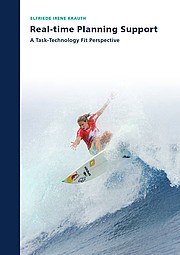Real-time Planning Support: A Task-technology Fit Perspective Defended on Friday, 19 December 2008
Planning technology by itself is not sufficient to improve planning performance. What are the factors that determine the extent to which the benefits of planning technology are realized? In order to answer this question, this dissertation studies four mechanisms of fit between task and technology based on results both from the laboratory and a survey conducted in the Dutch transport sector. We specifically focus on the transport context as, on one hand algorithms supporting the planning task are extensively studied, and on the other hand, they are used in practice to a low extent. Apparently, task and technology do not fit. We contend that task-technology fit becomes more important as planning has to provide real-time services. Planners need technology that better fits their information processing, and algorithms need the assistance of the human planners to assess data reliability. Our results indicate that presentation can be used to increase adoption rates of above mentioned algorithms both for manual planning as well as for deliberative use of decision support. Providing functionality for collaborative optimization in addition to functionality for isolated optimization can further increase the extent to which planners make use of specialized planning technology. In addition, this thesis examines the human factor in planning, specifically the role of interdependence between planners, decision making style of planners and organizational structure. The practical implications of this dissertation are of interest mainly for managers in transport and transport software companies. The theoretical contribution relates to the field of Behavioral Operations Management.
Keywords
behavioral operations management, real-time transport planning, task-technology fit












